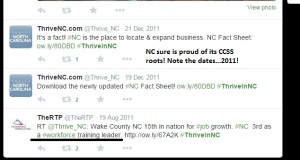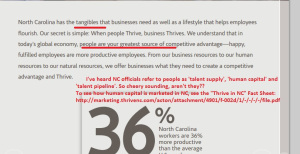Known by a bevy of names, let’s see what we can learn today about CCSS and job development investments grants. Are they only in NC (where I first learned about them) or are these in other states? If so, what are the educational implications?

The Name Game:
As knee deep into CCSS as NC is, I wasn’t too terribly surprised to find one more ‘cutesy’ name to identify yet another grab at jobs and the economy..but is all this tied to education? If so, how? The first name I came across was JDIG, standing for “Job Development Investment Grants”. All the information about JDIGs wasn’t on a JDIG website. No, all the information I found was on a site called “Thrive in NC”. (see: http://www.thrivenc.com/incentives/financial/discretionary-programs/job-development-investment-grant) Now, if you look at the top of the website page, you’ll see the Economic Development Partnership of NC’s name. We’ll come back to the EDP of NC in a little bit. First, what is a JDIG? According to Thrive’s website description, it’s a program embedded in the NC General State Statutes. That means it’s a law that’s been decided upon by the GA (General Assembly) via voting.
So, what’s the law when it comes to JDIGs? In a nutshell, here’s what NC Legislative Study found and has laid out per § 143B-437.50:
1) It’s state policy that NC generate jobs, keep the economy boosted via expanded industries already here and attracting new ones. What we’ve seen via the CCSS/CTE agenda in relation to this is that to accomplish this: anything goes.
2) Not content with keeping NC focused, part of the law is tracking international and national jobs, economic growth as well. Yep, in all things CCSS/CTE, we must be ‘cookie cutter’, workforce ready drones.
3 and 4) Since the economy is changing, re-evaluting how industries are attracted is vital. To accomplish this ‘certain programs’ must be updated. (No specifics here, of course) Also, because of all this updating, not only will citizens be better off, so will the ‘political subdivisions’. With CCSS/CTE firmly in place, states have lost their backbone and sacrificed their U.S. Constitution based 10th Amendment power.
Statute § 143B-437.51 defines all that is in the preceding Statute. You’ll want to note what types of industries, and/or businesses can qualify for the JDIGs. CCSS/CTE groups especially like non-profits to ‘hide’ behind. NC’s Statute includes non-profits. (*Note: this is not to suggest all non-profits are CCSS/CTE aligned, nor are all businesses, industries.) This statute also includes community economic development boards..and we know how integral these are with Chambers of Commerce. Remember, the U.S. Chamber of Commerce received millions from the Gates Foundation for the express purpose of selling us the CCSS/CTE. Each state has been privy to those funds. Look at how hard NC’s Chamber promotes CCSS/CTE. (*Note, my fellow NC resident and anti CCSS warrior, Lady Liberty 1885, has the entire soap opera like drama extremely well detailed on her blog. See: http://ladyliberty1885.com/2015/03/12/foia-nc-chamber-pushing-asrc-to-consider-rebrands-like-florida/ )
Statute § 143B-437.52 is the one which explains how the JDIGs will work and will also include the Attorney General of NC. So, in lay man’s terms, any qualifying business or industry meets with the NC Economic Council and the State AG to determine HOW the growth of jobs (and don’t forget where jobs are, so is education and training) is to be accomplished. (*NOTE: this is my interpretation. I am NOT a lawyer.)
Statute § 143B-437.53 reveals number crunching..as in how many JDIGs in any given area of the state. It appears too many in one location isn’t the best for NC. Whatever happened to freedom of choice where my business is located? Well, in a CCSS/CTE aligned world, freedom’s an enemy.
So, who makes up the Economic Council which makes a lot of these state wide impacting decisions?? Great question. According to this set of statutes, The Secretary of Commerce, the Secretary of Revenue, the Director of the Office of the State Budget/Management, and two private sector appointees from the General Assembly. (*NOTE: this is all NC state level government. You’d have to check your state for JDIGs or similar if you live outside NC. See who’s involved and to what degree.)
To see the rest of the JDIG related Statutes, including how the individual community economic councils are involved, see: 2013-JDIG-TempUpdates What I can tell you is the “Thrive in NC” website page of member community econ councils is like a “Who’s Who in the Hall of Career Tech Education”. Be sure to enlarge the screen shot below.
Here’s a set of Tweets about the “Thrive in NC” marketing strategy from 2011:

To see a more modern sales pitch for trained workforce seekers, see below:
[youtube https://www.youtube.com/watch?v=jlG7T1Uzg9I&w=560&h=315]
To access more information on JDIGS in NC:
http://www.thrivenc.com/incentives/financial/discretionary-programs/job-development-investment-grant
Is There a JDIG in MY State?:
Your state may OR may not use the same title that NC has chosen. I have found one nationally encompassing document that features all the places you can find career development or workforce training grants, especially those ‘under served’ groups of people. See: career_development_grants_for_underserved_populations
You’ll also want to access the U.S. Dept. of Labor. Just last year, 2014, they gave over 50 million dollars to various states and/or schools for workforce job development training programs. See: http://www.dol.gov/opa/media/press/eta/ETA20141754.htm
If you cannot locate your state’s information from either of the above resources, try it from the U.S. Economic Development Administration angle. after all it’s part of the U.S. Chamber of Commerce! See: http://www.eda.gov/
Their Career Tech Education (CTE) list is quite long and involves many states. See: http://search.eda.gov/search?utf8=%E2%9C%93&affiliate=eda&query=Career+Tech+Education&commit=Search
Here’s an excerpt from a stunning report the EDA has. “This report on the Jobs and Innovation Accelerator Challenge (JIAC) program represents one element of the larger effort, and has been produced alongside reports on parallel studies of the i6 Challenge (i6) and Trade Adjustment Assistance for Firms (TAAF) programs.” (*NOTE: here are other named programs you can use to search for in your state!!) To get the entire study so you can find out how careers, clusters, economy, data tracking, and assessment all are interwoven:
EDA-JIAC-Program-Assessment-and-Metrics Oh, and you’ll love this if you live in NC, UNC-Chapel Hill partnered with SRI International to conduct this study project which was completed in 2014.
A few other investment projects you might be able to glean more from, hardly an exhaustive listing, but a start.
AAUW (American Association of University Women), gives career grants, especially if you’re looking for a STEM related career. (*NOTE: STEM is CCSS’s granddaddy. That was revealed in my PCAST, STEM, and CCSS article in late 2014) See: http://www.aauw.org/what-we-do/educational-funding-and-awards/career-development-grants/
Nationwide Workforce Development programs from the Weinberg Foundation. See: http://hjweinbergfoundation.org/program-areas/workforce-development/ (*NOTE: to see their CTE contributions, http://hjweinbergfoundation.org/?s=career+tech+education)
You’ll get plenty of CCSS/CTE agenda with Workforce training from the EPA (Environmental Protection Agency) See: http://www.epa.gov/brownfields/job.htm
Previously Published and Related:
NC’s push to combine Workforce and Community Colleges: https://www.commoncorediva.com/2014/10/09/tech-thursday-ncs-workforce-despicable-moves/
Workforce alignment, apprenticeship alignment, and more CCSS/CTE: https://www.commoncorediva.com/2014/11/06/tech-thursday-workforce-commissions-education-and-common-core/
Closing:
It would appear from all this that not only is education compromised via CCSS, CTE, but our state level economies. Not only will we need to research the educational side of our states, but it appears we’ll need to see where our Attorney Generals, Secretary of Economy, etc. stand on CCSS/CTE.


Reblogged this on Tillett For CT and commented:
Is this going on in CT?
If you have heard about this update me on what is happening & what they are calling it here in CT.
I found the EWIB (Eastern CT Workforce Investment Board), CT Workforce Development Council, Capital Workforce Partners, Workforce Alliance, The WorkPlace, Inc., NW Regional Workforce Investment Board. This link from the EWIB, gives you all the CT players in the workforce ‘game’. http://www.ewib.org/Default.aspx?tabid=78 (you’ll find the CT Dept. of Ed, Adult Ed, economic, and labor) Follow this link for all the CT Workforce Partners, http://www.ewib.org/Default.aspx?tabid=75 (again, CT Dept. of Ed, etc. are there). If you’d like to see the entire CT Economic Plan (where goal #2 is increasing the talent pool via education), go to this link: http://www.ct.gov/ecd/lib/ecd/strategic_plan_final_July_2014.pdf
I hope this helps.
Thanks for the links